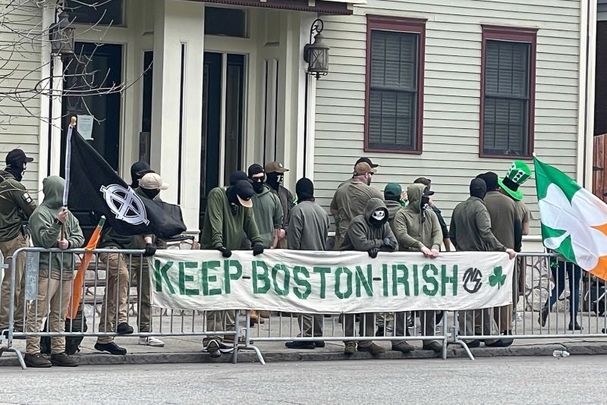The recent attempt by members of the neo-Nazi group Nationalist Social Club / NSC 131 to co-opt the message of the South Boston St. Patrick's Day Parade is a wake-up call on the perils of airbrushing or diluting the Irish American experience.
During the parade, NSC 131 was seen dressed up in their army field jackets, khaki pants, and black face masks (which one can reasonably surmise had nothing to do with COVID safety protocols) with a banner "Keep Boston Irish."
@universalhub wtf pic.twitter.com/ND2BQdwjES
— Sarah (@SaraXinyi) March 20, 2022
One suspects that many of this group would be hard-pressed to find Ireland on a map if challenged, let alone realize the historical absurdity of their sign.
Almost one hundred and eighty-five years ago, September 12, 1837, there was another parade in Boston. The occasion then was the annual muster of the militia companies of Boston.
Among them was the newly formed 'Montegomery Guards,' named after Dublin-born Richard Montgomery, the first U.S. general to die in combat during the Revolutionary War. The regiment was composed of recently arrived Irish immigrants who wished to demonstrate their loyalty to their new home by volunteering for its defense.
Unfortunately, the guard was met by the 19th-century ideological ancestors of NSC 131 who wanted to "Keep Boston Puritan." Several nativist militia companies refused to parade with the Irish Catholics. Similar to what was reported in Boston on March 20, 2022, fake news flyers were being passed out on "the dangers of arming Irishmen" and warning of a "papist conspiracy to take over the country."
When the Montgomery Guards returned to their barracks, they were violently attacked by members of the 19th-century version of NSC 131 as the local police watched and did nothing. Although the Boston newspapers praised the Montgomery Guards for their courage and discipline, the Governor of Massachusetts ordered the disbandment of the Montgomery Guards on the pretext their existence would provoke "outrages of a dangerous character"; the ultimate in blame the victim.
Of course, this was neither the first nor last of such anti-Irish incidents in Boston or elsewhere in our nation. Irish immigrant Ann Glover was hung in Boston as a witch on the 'evidence' she could not recite her prayers in English, only in Latin and Irish.
Future President John Adams won an acquittal in the Boston Massacre trial by convincing the jury that the British soldiers were acting in self-defense against "a motley rabble of saucy boys, Negroes, and mulattos, Irish teagues and outlandish jack tars" (translation, 'not proper Bostonians').
When he ran for President in 1960, John F. Kennedy faced frequent acquisitions that an Irish American Catholic he was not a true American and was prone to divided loyalties.
Sadly, we continue to hear that charge today in confirmation hearings on Capitol Hill. All these acts were perpetrated in the name of the same perverted philosophy as those holding the "Keep Boston Irish" banner in South Boston.
Knowledge is the best antiseptic for the disease of hate and the vile uninvited display witnessed at the South Boston St. Patrick's Day Parade and the attempt to hijack our heritage, but this highlights the more significant issue of why this knowledge is lacking, not only in the Irish American but the broader community.
Media pundits and academics frequently chide the Irish American community that 'they should remember their history,' but how can someone remember something never taught?
On the contrary, rather than educating on the Irish American experience, we see revisionists such as Dr. Richard Jensen claiming that "No Irish Need Apply" was "a myth of victimization"; a claim uncritically parroted by American academia until a high school student showed how specious Dr. Jensen's claim was (shades of Hans Christian Anderson's 'The Emperors New Clothes').
We see educational institutions continuing to lionize bigot Thomas Nast as the 'father of the political cartoon' while carefully sidestepping, and at times justifying, his blatant Irish and Catholic prejudices.
We see educational institutions like the New York's Tenement Museum curtailing its Irish programing to tell other stories, when in fact, all stories should be fully told without competition.
Despite being proclaimed by American Presidents since 1991, the call to celebrate the trials and triumphs of Irish Americans during Irish American Heritage Month goes unheeded by too many of our institutions despite the lengths they go to honor other Heritage months. In the darkness of this ignorance, groups such as NSC 131 thrive.
The current academic and societal trend of blanketly assigning historical experience based solely on skin pigmentation is bad scholarship and fosters an "us versus them" mentality that unwittingly plays right into the hands of groups such as NSC 131. Irish Americans have nothing more in common with NSC 131 than the 'Know Nothings' of the 19th century. Airbrushing from our school's curricula and societal consciousness any discussion of the time when Irish Americans (and Italian Americans, Jewish Americans, etc.) were "others" unintentionally is giving aid and comfort to white supremacists groups.
A richer exploration and understanding of our history would show that while our stories are different, we have so many shared experiences that unite us rather than divide us.
*This column was submitted to IrishCentral by Neil F. Cosgrove, the National Irish American Heritage Month Chair at the Ancient Order of Hibernians. To submit to IrishCentral, sign up for our contributors platform IrishCentral Storytellers here.




Comments